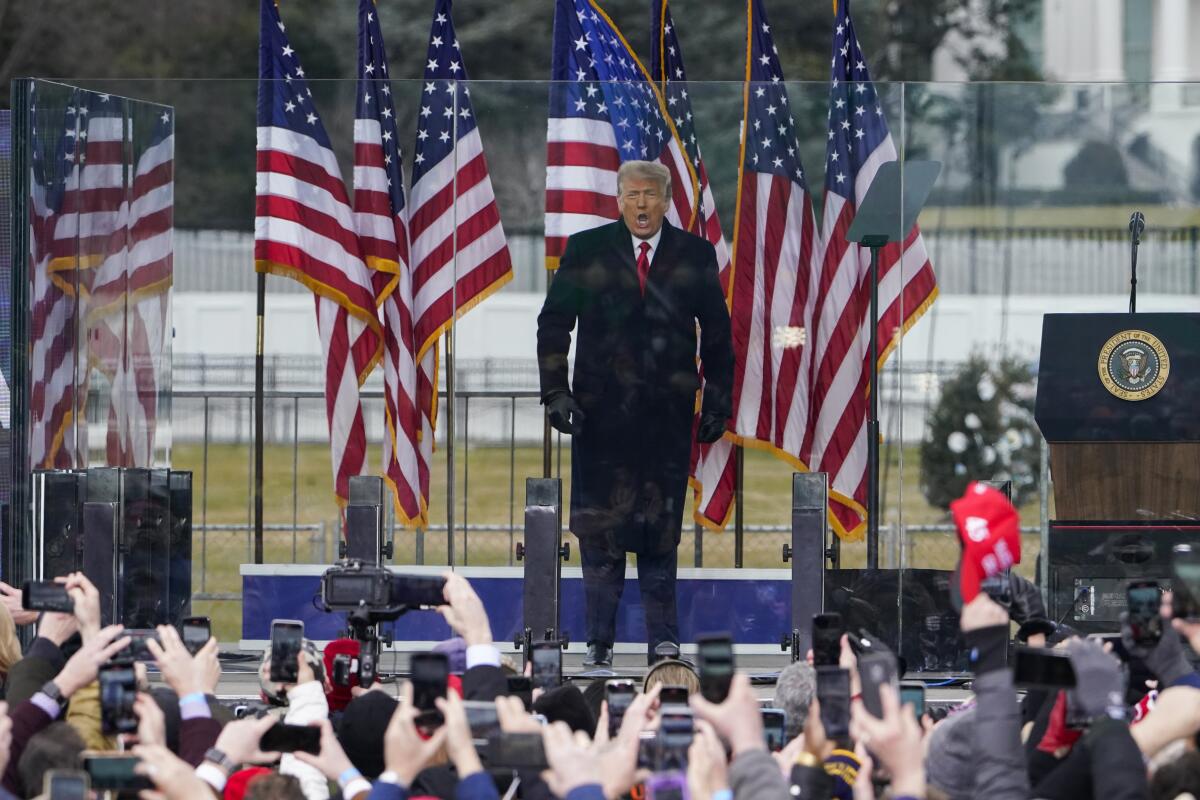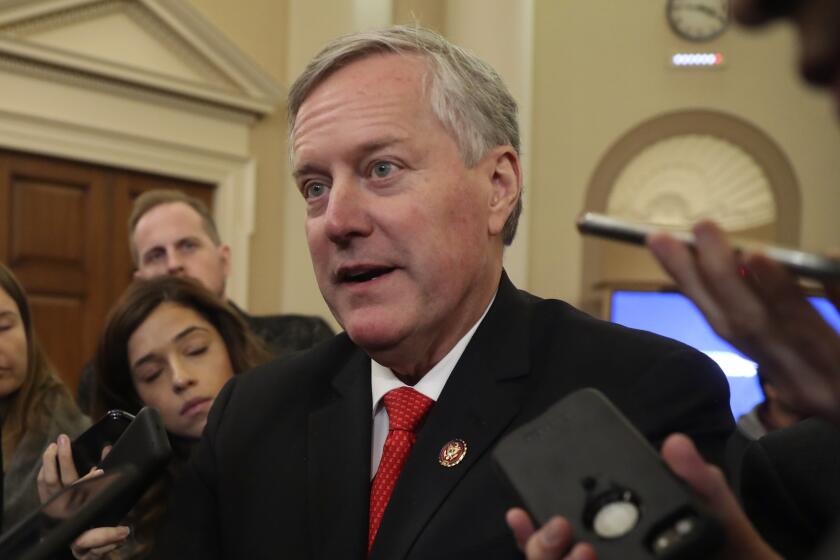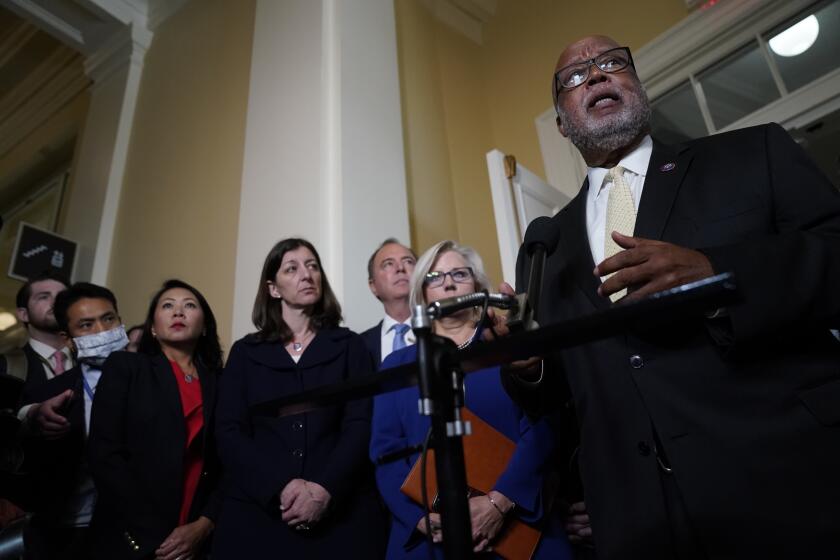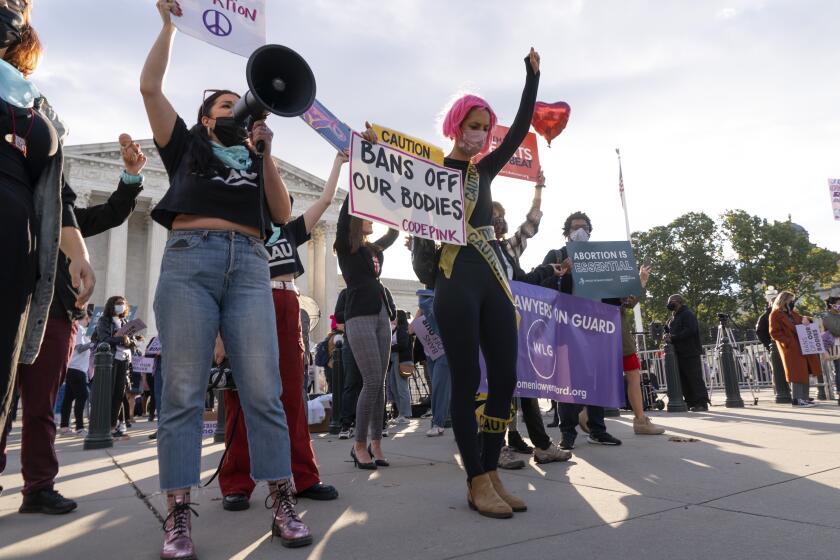Do Trump’s Jan. 6 sins of omission and commission make him criminally liable?

- Share via
Rep. Bennie Thompson, the Democratic chair of the House Select Committee investigating the Jan. 6 Capitol attack, has made it clear that the panel is focused intently on former President Trump’s three-plus hours of scandalous silence as the insurrection raged.
Commentators have suggested that as odious as Trump’s silence may have been, it does little to ground a criminal case because criminal law punishes people for action rather than inaction.
But that principle has important exceptions that apply precisely to Jan. 6 and Trump. Beyond that, as more evidence is revealed, it’s increasingly obvious that the former president did act — by encouraging the disruption of the election certification. All in all, a criminal referral to the Department of Justice is a real possibility (whether Atty. Gen. Merrick Garland pursues it is another matter).
Here’s how the action-inaction distinction operates: Criminal liability generally requires the combination of intent and action, which is why omitting to act typically doesn’t land you in jail. But when a defendant has a legal duty to act and does not, the principle gives ground.
President Trump’s chief of staff, like Stephen K. Bannon, flouted a congressional subpoena. Will he too be charged with criminal contempt?
Say a lifeguard neglects their duty to save a floundering swimmer or a father refuses to support his family. In those situations, the omission is the action required to ground a criminal charge. (It still must coincide with a culpable intent, or mental state; more on that below.)
Not surprisingly, there is no express case law on whether the Constitution’s “take care” clause — which instructs the president to “take Care that the Laws be faithfully executed” — gives rise to a legal duty to do more than just stand by as the Constitution is trampled and members of Congress and a peaceful transfer of power are endangered. But it is hard to see how it could be otherwise.
Inaction is also no protection from criminal liability when its opposite is necessary to prevent damage caused by previous conduct, even innocent conduct. A driver who hits a pedestrian, even if the driver is not at fault, can’t just leave the scene. Or, if you happen to have poison sitting around the kitchen that looks like sugar, you can’t keep quiet as your friend dips into it, thinking he’s sweetening his tea. In such instances, omission is again tantamount to action; and if done with the requisite mental state, can be a crime.
In Trump’s case, even if he anticipated merely a peaceful rally at the Capitol on Jan. 6, his role in setting a deadly insurgency in motion arguably means he could not legally decline to intervene as if he were just an accidental bystander.
The House committee is playing for keeps against the GOP’s falsehoods — that there was no insurrection, that the mob was peaceful and that the 2020 election was stolen.
Trump’s criminal liability isn’t only dependent on the fact that inaction can sometimes break the law. He is vulnerable to an even more potent charge — aiding and abetting criminal behavior.
The federal criminal code considers anyone who induces, or aids and abets, a crime to be no different from the person who pulls a trigger, or for our purposes, storms the U.S. Capitol. If you aid and abet someone who executes a crime, and if you possess the requisite mental state — essentially a desire for the offense to occur — you too are liable, as a principal defendant.
In Trump’s case, the indictment sheet would cite not only Title 18, U.S. Code, Section 2, which proscribes aiding and abetting a crime, but also Section 1512, which makes it illegal to obstruct or impede (or to try to obstruct or impede) any official proceeding — including Congress’ certification of a presidential election.
Trump would try to contest that certification fits the meaning of an official proceeding in the criminal code, but a recent ruling from a Trump-appointed judge confirms that it does. Nor is there any real question but that the frothing Capitol rioters were seeking to obstruct or impede the tallying of the vote on Jan. 6.
So the question for a jury would be, did the president encourage the Jan. 6 mob to attack, and did he do it with the intent that Congress be impeded?
Oral arguments in Dobbs vs. Jackson Women’s Health Organization telegraphed a decision that would leave the court with no principled way to adjudicate abortion limits.
Recent evidence emerging from the House investigation is damning. While Trump supporters raged and members of Congress cowered, the president’s closest advisors pleaded with him to call off the dogs — but he did nothing for more than three hours. His silence may have buoyed the rioters, many of whom declared they were doing Trump’s bidding.
Had Trump’s intent been merely that the Jan. 6 mob make its 1st Amendment-protected views about the election known, then he wouldn’t have refused to act when the exercise turned so completely sinister. He would have jumped to put things back on his desired track.
But he didn’t, and by some accounts he was jubilant that the certification process had been at the least interrupted. He needled House Minority Leader Kevin McCarthy (R-Bakersfield): “I guess these people are more upset about the election than you are.”
Doing nothing might seem benign or at least defensible in most chaotic situations. But the more we find out about Trump’s inaction (and his actions) related to Jan. 6, the more his potential culpability becomes clear. His omissions once the rioting began weren’t just irresponsible and despicable; they were deadly.
And could very likely lead to a criminal referral from Congress.
More to Read
A cure for the common opinion
Get thought-provoking perspectives with our weekly newsletter.
You may occasionally receive promotional content from the Los Angeles Times.













